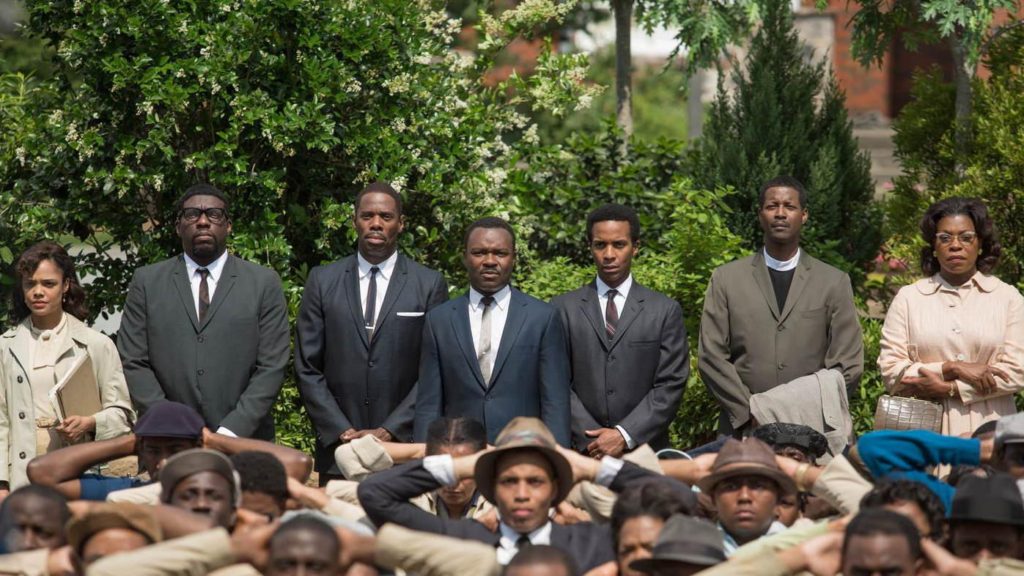
“Three hundred years of humiliation, abuse and deprivation cannot be expected to find voice in a whisper. The storm clouds did not release a ‘gentle rain from heaven,’ but a whirlwind, which has not yet spent its force or attained its full momentum.” – Martin Luther King, Jr.
Selma, Alabama, March 1965 was part of the whirlwind.
In the case of Ava DuVernay’s Selma, you have to soak in the history before you can even start to talk about the film. Or rather say, as we watch racial injustices echo down the canyon of the past into our broken present, be galvanized by the history.
To grapple with the spiritual significance of the events that inspired this film is, truly, to approach a mountain. You look up, you gasp, and you say, “My feet are too weak to climb it.” Yet climb we must.
When Martin Luther King, Jr. arrived in Selma, Alabama in January 1965, he had arrived in a city whose population was more than half Black but whose voting rolls were only 1% Black. Despite the Civil Rights Act of 1964, Alabama was among the Southern states who were still effectively disenfranchising most of their own African American citizens. As we consider the spiritual aspects of this chapter in history, we instantly must reckon with the fact that a country calling itself Christian was in this aspect belying its professed faith.
Over the course of the next two months, King and fellow organizers staged a series of protests culminating in 25,000 demonstrators making the 3-day, 50-mile march from Selma to the state capitol of Montgomery. The march and the grueling leadup to it helped paved the way for the Voting Rights Act of 1965. The act, signed into law in August of that year, forbade racial discrimination in voting and led to a great increase in Black citizens being allowed to vote across the country. The film tells this story from King’s arrival in Selma to the completed march itself.
But what about the film itself? How can its own spiritual import be worth anything alongside the weighty events themselves? You begin to realize the film will be blessedly diligent in this area as soon as David Oyelowo’s King asks Mahalia Jackson for a song. In a moment of heavy contemplation, he calls the Queen of Gospel late in the evening and says, “Halie? I need to hear the Lord’s voice.” After clearing her throat and rising from bed, Jackson sings into the phone. She sings the chorus of the Rev. Thomas A. Dorsey’s “Precious Lord, Take My Hand.” It is said that this was actually King’s favorite song. In fact, this is a song that the real-life Mahalia Jackson used to sing at civil rights rallies and that King requested she sing for his funeral. In the film, we see King drinking in the encouragement of this moment, a moment that lifts the weights of time and space and offers the hand of the Lord in their place.
It is a moment of unobtrusive but unapologetic appreciation for the spiritual roots of King’s work, and the rest of the film follows this pattern. One of the richest moments in this vein comes when King comforts the grandfather of slain civil rights activist Jimmie Lee Jackson with these words, “God was the first to cry.” Here the film makes the striking choice to evoke Jesus weeping at Lazarus’s death, reminding us of the divine eye shedding tears over this societal trauma while still keeping us firmly grounded in the earthly struggle against racial injustice. DuVernay’s film does indeed join in this sacred grieving, yet also rejoices in justice and the people that struggled toward it at this moment in history.
Ultimately, the film’s attention to these things brings it to a rare level of spiritual significance : it illuminates for us how the defeats of prejudice and the victories of justice are not merely social. They are also spiritual defeats and spiritual victories for societies and the people in them, markers of spiritual failure or spiritual life for those with eyes to see.
– Brian Duignan
- Directed by: Ava DuVernay
- Produced by: Oprah Winfrey Nik Bower Christian Colson Ava DuVernay Dede Gardner Paul Garnes Jeremy Kleiner Cameron McCracken Diarmuid McKeown Brad Pitt Nan Morales
- Written by: Paul Webb
- Music by: Jason Moran
- Cinematography by: Bradford Young
- Editing by: Spencer Avaric
- Release Date: 2014
- Running Time: 128
- Language: English
Arts & Faith Lists:
2020 Top 100 — #92